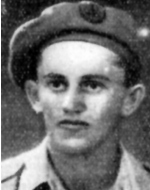Neuger, Alexander (Olek, Alex)
Son of Tzila and Chaim Nachman, was born on the 2nd of Cheshvan 1921 in the city of Krakow, Poland. His father, the merchant of Bar-Orin, who served as a reader in the old synagogue in the city, made sure that his children knew Hebrew and were proficient in the Bible, and the atmosphere of their home was saturated with the values of Torah, Studied frameworks in a school affiliated with the Hebrew Gymnasium in Krakow, and in 1931 joined the “Hashomer Hadati” and the education he received at home was for religious-pioneering education. He was active in the “Ken”, fulfilled his duty and lived the life of the movement with all his soul. In 1938 he went on to train in the “Bereshit” group in Fezdebush and Zilonka and worked in a steel factory. From there the group moved to Radom and for a while served as a working orderly. He was quiet and dedicated but firm, and the few things he would say during a discussion and arguments excelled in a clear and clear analysis. At the outbreak of World War II he went with the group to Bialystok to immigrate to Eretz Israel via Vilna, but was caught on the border and sent to the Russian territory. Again he tried to cross the border and this time it came to him. His friends gathered behind the border and joined a group in the village of Kalinava (near Kovno) and from there he arrived in Israel in Adar 1941. Alexander joined the Avraham group, worked in the orchards and in the Karkur building and in the farmers’ farms in Givat Ada. He received everything in simplicity and innocence and saw every day another white labors in the building of the land, and Alexander took the Lev of everything in his integrity and willingness to help with his work, and in 1943 enlisted in the British army and served in a company of Hebrew electricians in Israel and Egypt. “When the” Avraham “group came to settle in Kfar Etzion, he was filled with enthusiasm: if not a real war, he would participate at least in the plant And in 1947 he married Hadassah Krantz, a member of the “Tahrir” youth group in the village, and found his gender: both were orphans, but full of will to live, healthy and strong in character. Alexander began to manufacture mines in his locksmith’s workshop, was active in security matters and was the first to go out to fight with the Arabs and sweep them all in. The Arabs and many of the enemy were hit by these mines. He was also responsible for the connection, and every day he encouraged by radio the women and children transferred to Jerusalem. Alexander was a commander standing in the western part of the village, confident and courageous. In this position, the enemy’s armor fell to the village on Wednesday, May 13, 1948. On that same day, Hadassah, his wife, fell on the 17th of Tishrei 5771 (17.11.1949) and was brought to rest with the other victims of the Gush, In the military cemetery on Mount Herzl in Jerusalem.
